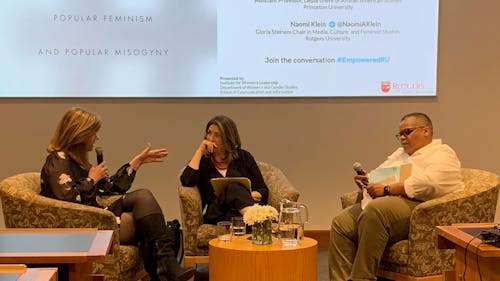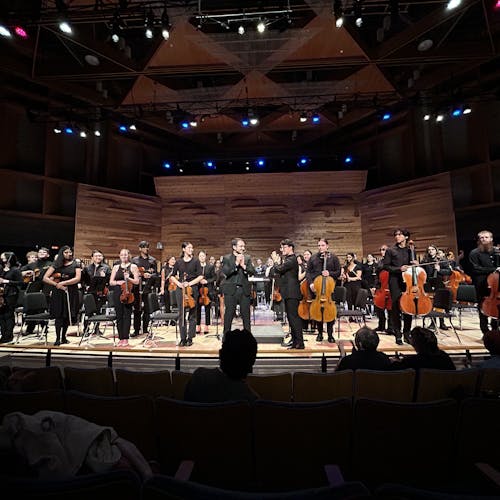How social media, consumer culture dilute feminist movements

The Rutgers Institute for Women’s Leadership, Department of Women and Gender Studies and Rutgers School of Communication and Information came together to host a phenomenal event last night at Alexander Library on the College Avenue campus. Renowned author and scholar Sarah Banet-Weiser discussed her latest book, “Empowered: Popular Feminism and Popular Misogyny.”
Banet-Weiser is currently a professor of Media and Communications and the head of the Department of Media and Communication at the London School of Economics and Political Science. In her professional work, she has worked to examine consumer culture from multiple different angles. She joined in conversation with Rutgers’ very own Gloria Steinem Endowed Chair in Media, Culture and Feminist Studies Naomi Klein.
Klein is an award-winning journalist, columnist and renowned author of multiple articles from The New York Times and international bestsellers. She is known for her outspoken political analyses and criticisms of corporate globalization and capitalism.
Joining Banet-Weiser and Klein in the conversation was Princeton University’s Keeanga-Yamahtta Taylor. Taylor is a revered academic and writer, and is currently an assistant professor of African American Studies at Princeton University. One of Taylor’s most famous books is “From #BlackLivesMatter to Black Liberation,” which examines the history and politics of Black America while also looking at the social movement Black Lives Matter in response to police brutality across the United States.
Students at the event were eager to get started as they talked among their friends and networked with faculty. “It’s important to have spaces like this because even today mainstream media and academia is very white-centered, so this continues conversations and raises awareness on the experiences of all women,” said Phia Trinidad, a School of Environmental and Biological Sciences senior.
Before the panelists began their discussion, Banet-Weiser gave a short talk on the basics she focuses on in her book. The main theme of Banet-Weiser’s book emphasizes the deeply intertwined relationship between popular feminism and popular misogyny as it plays out in various multimedia platforms and nonprofit campaigns.
Klein was keen to explain the importance of today’s discussion. “Professor Banet-Weiser and Professor Taylor are two people who I think are thinking most deeply about the tension between visibility in the context of the economy and real political power," she said. "We live in a time where it’s very confusing to navigate the fact that feminism is so politically popular but women’s rights, the rights of people of color and LGBTQ folks are under attack on every front.”
From there, the conversation ventured into how consumer culture and corporate capitalism can distort the true meaning of feminism. Big brands and stores like H&M are quick to commodify feminism by putting slogans on T-shirts, but only to make a profit. Panelists talked about how the constant visibility of a movement doesn’t mean it’s gaining momentum or making active change. Sometimes the visibility can put an end to the movement.
Taylor eagerly raised the issue around the role of social media in social movements today and added to the idea that more visibility isn’t always good. The ideology behind the structure of social media focuses very much on individuals and their online worlds. It becomes difficult to generate collective action when people think they can make a difference simply through a tweet. Coupled with the constantly changing news cycle, many people get desensitized to the struggles that feminism and the feminist perspective are fighting to end.
The event unraveled further as the panelists explored the misogynistic backlash that goes hand-in-hand with many feminist movements. The conversation dissected how men’s rights movements feel threatened when women feel empowered. Banet-Weiser explained how misogynistic ideals and movements combat women’s empowerment and feminism with vitriolic rhetoric. Men’s rights organizations use feminist politics, but distort them to match their own agenda.
The talk highlighted that popular feminism can sometimes get lost in mainstream definitions and capitalist agendas, but it’s important to understand that if your feminist perspective doesn’t include race, sexuality, gender and class then it renders the oppression of masses of people invisible.



